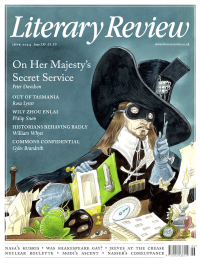Lamorna Ash
Flight of Fantasy
All Fours
By Miranda July
Canongate 336pp £20
Fantasy benders. This is what the unnamed protagonist of Miranda July’s second novel, All Fours, calls her mental flights into weird, funny and often erotic alternate realities. ‘You can’t have everything you want, but you can want everything you want’, another woman tells her when she describes all this unsatisfied
desire roiling inside her. She attributes the line to Simone de Beauvoir, but really it is a bastardisation of a much-cited quotation from one of de Beauvoir’s love letters: ‘I want everything from life. I want to be a woman and to be a man, to have many friends and to have loneliness, to work much and write good books’. But, she concludes, ‘it is difficult to get all which I want. And then when I do not succeed I get mad with anger.’ You can want all you want, but, left unenacted, such wanting might drive you insane.
Like July, the unnamed protagonist achieved ‘success in several mediums at a young age and has continued very steadily, always circling her central concerns in a sort of ecstatic fugue state’. July’s own body of work, which comprises film, text and performance art, has always provided a space for her characters to act out their private fantasies, through roleplay, simulation and dance. In her first feature film, Me and You and Everyone We Know (2005), the protagonist (played by July, awkward and earnest in all her acting work) is a performance artist who in one short scene engages in a shared fantasy with a stranger of a whole life lived out together – it ends as they part ways to find their cars. In her first novel, The First Bad Man (2015), the protagonist and her tenant re-enact (word for word, motion for motion) 1990s videos instructing women how to fight back when men try to assault them. In her most recent feature film, Kajillionaire (2020), the unconventional family at its centre play-act a normal family scenario with imaginary cake on real plates. All Fours, by contrast, explores what happens when desire collides with reality – real cake on real plates.
It opens with the promise of a road trip. The 45-year-old protagonist (she imagines this age to be the ‘midpoint’ of her life: ‘a body rises, reaches an apex, and then falls’) intends to leave her husband and child in Los Angeles for two-and-a-half weeks, drive to New

Sign Up to our newsletter
Receive free articles, highlights from the archive, news, details of prizes, and much more.@Lit_Review
Follow Literary Review on Twitter
Twitter Feed
In 1524, hundreds of thousands of peasants across Germany took up arms against their social superiors.
Peter Marshall investigates the causes and consequences of the German Peasants’ War, the largest uprising in Europe before the French Revolution.
Peter Marshall - Down with the Ox Tax!
Peter Marshall: Down with the Ox Tax! - Summer of Fire and Blood: The German Peasants’ War by Lyndal Roper
literaryreview.co.uk
The Soviet double agent Oleg Gordievsky, who died yesterday, reviewed many books on Russia & spying for our pages. As he lived under threat of assassination, books had to be sent to him under ever-changing pseudonyms. Here are a selection of his pieces:
Literary Review - For People Who Devour Books
Book reviews by Oleg Gordievsky
literaryreview.co.uk
The Soviet Union might seem the last place that the art duo Gilbert & George would achieve success. Yet as the communist regime collapsed, that’s precisely what happened.
@StephenSmithWDS wonders how two East End gadflies infiltrated the Eastern Bloc.
Stephen Smith - From Russia with Lucre
Stephen Smith: From Russia with Lucre - Gilbert & George and the Communists by James Birch
literaryreview.co.uk